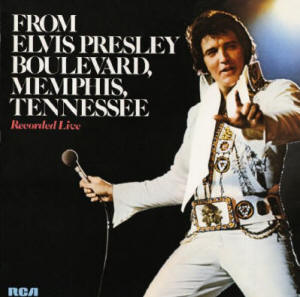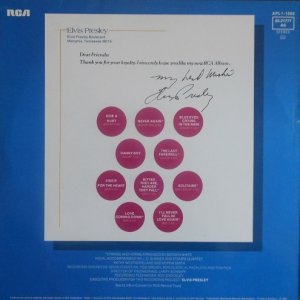

When "From Elvis Presley Boulevard, Memphis,
Tennessee" was released in May 1976, a year had
passed since "Elvis Today" hit the stores. It
was the longest time span between two albums
with new recordings of the king. On June 5th the
longplayer entered Billboard's "Top LPs Chart",
had a run of 17 weeks and peaked at number 41.
On June 12th the record also appeared on the
"Hot Country LPs Chart", where it stayed for 27
weeks and became a number one hit. In October
1977 the RIAA honored the domestic sales with a
Gold Award, RCA celebrated the success in the
country segment with a Golden Boot Award and the
RVC Coporation credited the sales in Japan with
a Best Seller Award. During the initial sales
period RCA retailed 300,000 copies of "From
Elvis Presley Boulevard, Memphis, Tennessee". In
total the album sold 2 million units, which
equals 300 million paid streams of the complete
album or 3 billion paid streams of individual
tracks. Therefore the longplayer sold better
than Elvis' previous ones, but the sales were
also driven by the king's demise in 1977. Simply
because the people picked up whatever was
available.
In 2016 the complete Presley catalogue was
restored and remastered by Vic Anesini for a
boxed set of 60 compact discs called "The Album
Collection". Sony Music Entertainment provides
the streaming platforms with the same versions
of the individual albums (some of them offering
bonus tracks), albeit in 24 bit/90 khz flac.
That means, if the platform of your choice
supports high resolution audio, you can enjoy
the tracks in the same quality Sony used to scan
and master them. On Spotify, which has a market
share of approximately 30% and is the only
platform that publishes streaming figures, "From
Elvis Presley Boulevard, Memphis, Tennessee"
accumulates 45 million streams. The compilation
album "Way Down In The Jungle Room", which was
released in 2016 and features remixed and
remastered versions of the tracks as well as
outtakes, clocks in at nearly 128 million
streams.
The cover was made up with the same retouched
photo, that had been used for the sleeve of the
single "For The Heart" / "Hurt". Elvis looked
much older than on the cover of "Elvis Today"
and also appeared somewhat disheveled. The
backside featured a letter from Elvis and the
tracklist. At the time there was much discussion
about the addition "recorded live", because the
album neither had been taped in front of an
audience, nor did it feature unedited
performances without overdubs.
Neither in 1974, nor in 1975 Elvis had
delivered as many tracks as he was supposed to
do and therefore had breached his contract with
RCA. But instead of suing the unreliable artist,
the label catered to his lethargy and installed
recording equipment in the den of his Graceland
mansion. The sessions were scheduled between
February 2nd and 7th and ought to produce 24 new
masters, the amount of tracks Elvis had agreed
to deliver every year. Unfortunately the king
just managed to tape 12 songs and insisted on
saving "Moody Blue" and "She Thinks I Still
Care", the most commercial tunes, for a future
single release. Nevertheless RCA was happy to
have enough material to fill a new longplayer.
"From Elvis Presley Boulevard, Memphis,
Tennessee" has a running time of 34:48 minutes.
Elvis' band consisted of James Burton (guitar,
February 2nd to 6th), Billy Sanford (guitar,
February 7th), Charlie Hodge (guitar), John
Wilkinson (guitar), Jerry Scheff (bass, February
2nd to 6th), Norbert Putnam (bass, February
7th), Ronnie Tutt (drums), Glen D. Hardin
(piano, February 2nd to 6th), Bobby Emmons
(piano, February 7th) and David Briggs (electric
piano). The harmony vocals were provided by J.D.
Sumner & The Stamps (Bill Baize, Ed Enoch, Ed
Hill and Larry Strickland) as well as Myrna
Smith and Kathy Westmoreland. The sessions were
produced by Felton Jarvis and engineered by
Brian Christian, Tom Brown and Ron Olson. The
overdub sessions took place at the Young'Un
Sound Studio in Murfreesboro/Tennessee under the
supervision of Felton Jarvis (producer) and Al
Pachucki (engineer).
In 2012 Follow That Dream Records released a
collector's edition of "From Elvis Presley
Boulevard, Memphis, Tennessee", which also
included outtakes. For a review tap
HERE.
Hurt
Elvis recorded "Hurt" on February 5, 1976 within
seven takes. Later harmony voices (February
16th) and drums (February 17th) were added. The
song wasn't a new one, in 1954 Roy Hamilton had
scored a top ten hit on the "R&B Best Sellers
Chart" and in 1961 Timi Yuro's version even made
it on the top 5 of Billboard's "Hot 100". When
Elvis' cover version of the song by Jamie Crane
and Al Jacobs was released on the b-side of "For
The Heart", it at least made it on the top 30. I
like the performance very much. The loved one of
the narrator has a new partner and the hurt and
pain is expressed in big voice and with a lot of
drama. "Hurt" instantly became a regular feature
of the king's live shows, one of these
performances can be found on the double album
"Elvis In Concert" (1977).
Never Again
Here we have another big voiced ballad about a
lost love, this time the singer swears to never
fall in love again, because he couldn't handle
another loss. The song was written by Billy Ed
Wheeler and Jerry Chesnut, who had also come up
with "It's Midnight" three years earlier. Just
like "Hurt" Elvis doesn't just sing the song,
but he virtually lives it. The song was recorded
on February 6th, the 14th attempt was approved
for post-production and release. On February
16th and 17th Felton Jarvis added harmony voices
and drums, on March 24th the recording was
enhanced with strings.
Blue Eyes Crying In The Rain
At the time most people associated "Blue Eyes
Crying In The Rain" with Willie Nelson, because
he had scored a number one hit on the country
charts with it the previous year. In fact, the
song by Fred Rose had been recorded for the
first time in 1945 by Roy Acuff. The singer and
his loved one have to part and he is sure, that
they will never meet again in this world. Elvis
taped "Blue Eyes Crying In The Rain" on February
7, 1976 within 5 takes, nine days later harmony
vocals were added. Even though the king still
sounds impressive at times, there are a few
moments where his voice is wearing thin and has
a nasal undertone. Felton Jarvis tried to hide
these problems by adding an artificial echo, but
for me this effect just makes it worse.
Danny Boy
The song was written in 1910 by Frederic
Weatherly and is based on "Londonderry Air".
Expecting his death the singer says goodbye to
his leaving son and does everything to get the
tears flowing. Once again Elvis proves to be the
master of rendition, his voice is full of
sadness and sounds absolutely stunning. Without
doubt nobody will ever be able to sing "Danny
Boy" better than the king! The first recording
of this song was done in 1915 by Ernestine
Schuhmann-Heink. Elvis followed her on February
5, 1976 and needed ten attempts to deliver the
ultimate version.
The Last Farewell
Many fans and critics consider it to be one of
the greatest musical mishaps of the former
rock'n'roll king to record a song by Roger
Whittaker. But in fact Elvis loved the song and
was eager to record it. In 1971 Whittaker hosted
a radio show on which he encouraged his
listeners to send him lyrics, which he turned
into songs. A blacksmith named Ron A. Webster
send a poem named "The Last Farewell". It's
about British soldier on an island in the South
See, who was ordered back home and has to part
with his loved one, knowing never to see her
again. Whittaker added a sentimental melody and
sold 11 million singles (which translates to 1.7
billion paid streams). Elvis recorded "The Last
Farewell" on February 2nd, the master take was
spliced of the takes number 3 and 5. The result
was later enhanced with Sherrill Nielsen's
harmony vocals and strings. Even though I like
the recording very much, the overdubs hide too
many details of the master take. In this case
less certainly would have been more.
For The Heart
The swamp rocker by Dennis Linde was supposed to
be the a-side of Elvis' previously released
single, but it was just listed on the "Hot
Country Singles Chart" and never made it past
number 45. Without doubt "Hurt" was the favorite
song. The king recorded it on February 5, 1976
(bass and harmony vocals were added on February
15th and 16th), but he wasn't the first to
release "For The Heart". The song had been
issued the previous year by Teresa Brewer on an
album called "Unliberated
Woman". Even though Elvis sounds a bit
toothless and tired, I like the song. He
harmonizes very well with his background
singers, it's somewhat reminiscent of the good
ole' days with The Jordanaires.
Bitter They Are, Harder They Fall
After the short excursion to rhythmical domains
the album returns to slow, big orchestrated
ballads. This one was written and recorded by
Larry Gatlin in 1973, Elvis taped his version on
February 2, 1976. Take number seven was later
enhanced with Sherrill Nielsen's harmony vocals
and strings. Once again the singer bemoarns the
failture of a relationship and once again the
king delivers a good, believable performance.
Solitaire
The song stays on topic and describes the fate
of a man, who was left by his wife and now
spends his time playing cards. Elvis' voice is
full of loneliness and pain, it's a very moving
presentation. It was taped on February 3rd, the
11th take was selected for release. On March
24th Felton Jarvis added strings. By the way:
Neil Sedaka didn't like Elvis' version of his
song, because the king changed it too much for
his taste. For me "Solitaire" is one of the
highlights of this album.
Love Coming Down
George Jones recorded Jerry Chesnut's "Love
Coming Down" in 1975, Elvis followed him on
February 6, 1976. The 5th attempt was later
enhanced with bass (February 15th), harmony
vocals (February 16th), a guitar (February 24th)
and strings (March 24th). The narrator hadn't
paid too much attention to his wife, because he
had focused on his career. Now she plannes to
leave him and he asks for a second chance. Elvis
performed the song in such a believable fashion,
that one might think he revealed a part of his
true feelings.
I'll Never Fall In Love Again
This ballad was written by Jimmy Currie and
Lonnie Donegan, who also recorded it in 1962.
But it was Tom Jones, who scored the big hit
with "I'll Never Fall In Love Again". In 1967
his version made it to number 2 of the UK Charts
and became a number one on Billboard's "Easy
Listening Chart" in the US. On February 4, 1976
Elvis recorded five takes of "I'll Never Fall In
Love Again", before he turned to "Moody Blue".
Then he recorded another six takes of "I'll
Never Fall In Love Again" and selected the 9th
one (the producer continued the numbering) for
release. The production was finalized on March
24th with the addition of strings. Here the
narrator was cheated on by his wife and
foreswears love completely. Elvis presents the
song in an absolute believable way, but also
sounds a bit strained.
Verdict
Compared to "Elvis Today" the singer's
voice has aged considerably, sounds less
vital and flexible and sometimes has tired
and nasal undertones. However, the choir and
the orchestra cover the deficiencies up to a
certain degree and in general the king still
manages to sound impressive.

(C) RCA Records
![]()

